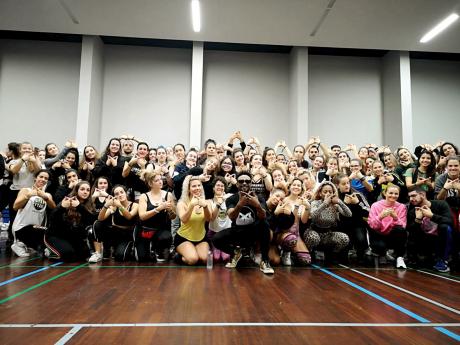The gospel of dance
Europe seems to be the new meeting place for Jamaican dancers. Dancers and choreographers like Dance Jamaica Academy’s founder, Latonya Style; Lonsdale ‘Boysie’ Guy, who received his training from the popular Gerald ‘Bogle’ Levy; and Sri Lanka of the Rifical Team, have been travelling to the far north, 0spreading the gospel of dancehall culture through dance workshops, camps, private classes and guest appearing in competitions as judges or special acts.
Style who is on her seventh tour of the continent, says dance is slowly taking precedence across Europe in countries such as France, Italy, Portugal, Poland and Germany. She was recently in Germany, after having performed in Portugal, and notes, “Dancers are getting more tour opportunities with the large number of dance events (big and small) happening throughout the year. The Europeans are also very competitive, so there are a lot of competitions including a dancehall queen contest happening in almost every country on this side of the world.”
In addition to Boysie and Sri Lanka, she has participated in and observed Kriptic Klique’s 7Ven; Xqlusiv Dance Crew’s Zidan; Keemi of the Elite Team Dance Factory; and Famous of Colo Squad during her tour. She says she is unable to count the total number of Caribbean dancers participating across Europe on both hands.
“There are so many dancers conducting tours at the same time, that it's a bit more challenging to get bookings, but it is a good reflection that dancehall continues to grow.
The popularity of dancehall culture in Europe has been on a slow and steady rise, especially as it relates to judging competitions. However, with the proliferation of more dancers, the space becomes more competitive. “This year’s tour is much smaller, only seven countries in comparison to previous years. For example, in 2016, I travelled to 14 countries and 19 cities in less than two months. Back then, fewer dancers were travelling because of visa issues,” she revealed.
Adaptation of Dancehall
Sri Lanka notes that many Europeans continue to adapt dancehall moves to other genres, especially Afrobeat, because it (dancehall) is a subculture. He has also toured Europe more than three times, and notes, “I don’t think we cooperate with a wide range of entertainers as much as we should, and I don’t think the artistes know how big an influence the dancers have on the music being played in Europe and how many people we reach out to.”
Kriptic 7Ven who was recently in Lyon France, shared the same sentiment. While it is his first experience touring Europe, he says, “The demand for dancers is even greater than the demand for the Jamaican artistes, because of the advantages.”
Some of the advantages is the one on one connection that the dancer makes with the participants - the actual gaining of knowledge on the history and culture of the people. “When artists perform, it is just a few songs, and then they are gone - in many cases the audience cannot even get a picture. But with dancers, they are able to build a connection,” he said.
Style concluded that dance can be a life changing platform for the tutor and the student. For that reason, and in order for local dancers to thrive, she says it is important to become knowledgeable about dancehall, be versatile in the different styles throughout the eras (from old to new school), and make their craft a part of their own life and growth.
“When I explain why I dance, and I share the influence the Jamaican culture and the environment I grew up in has on my dance, several people tell me it has been a life changing experience. Added to professionalism, that’s my advice to upcoming dancers to conquer the world with their God-given talent and skills.”




